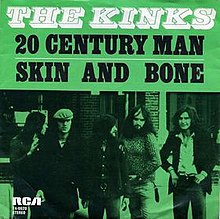
Sir Raymond Douglas Davies is an English musician. He was the lead vocalist, rhythm guitarist, and main songwriter for the rock band the Kinks, which he led with his younger brother Dave on lead guitar and backing vocals. He has also acted in, directed, and produced shows for theatre and television. Known for focusing his lyrics on English culture, nostalgia, and social satire, he is often referred to as the "Godfather of Britpop", though he disputes this title. He was inducted into the Rock and Roll Hall of Fame as a member of the Kinks in 1990. After the dissolution of the Kinks in 1996, he embarked on a solo career.
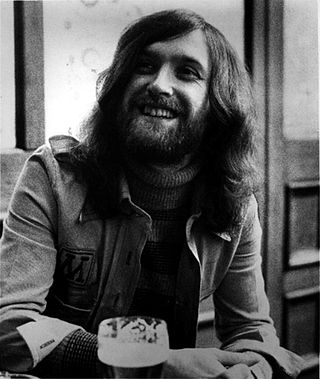
David Russell Gordon Davies is an English guitarist, singer and songwriter. He was the lead guitarist and backing vocalist for the English rock band the Kinks, which also featured his elder brother Ray Davies. He was inducted into the Rock and Roll Hall of Fame in 1990 as a member of the Kinks.
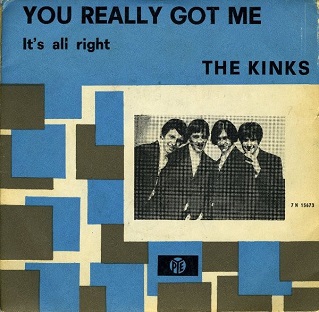
"You Really Got Me" is a song written by Ray Davies for English rock band the Kinks. The song, originally performed in a more blues-oriented style, was inspired by artists such as Lead Belly and Big Bill Broonzy. Two versions of the song were recorded, with the second performance being used for the final single. Although it was rumoured that future Led Zeppelin guitarist Jimmy Page had performed the song's guitar solo, the myth has since been proven false.

Muswell Hillbillies is the tenth studio album by the English rock group the Kinks. Released in November 1971, it was the band's first album for RCA Records. The album is named after the Muswell Hill area of North London, where band leader Ray Davies and guitarist Dave Davies grew up and the band formed in the early 1960s.

Arthur (Or the Decline and Fall of the British Empire), often referred to as just Arthur, is the seventh studio album by the English rock band the Kinks, released in October 1969. Kinks frontman Ray Davies constructed the concept album as the soundtrack to a Granada Television play and developed the storyline with novelist Julian Mitchell; the television programme was never produced. The rough plot revolved around Arthur Morgan, a carpet-layer, who was based on Ray and guitarist Dave Davies' brother-in-law Arthur Anning.

Lola Versus Powerman and the Moneygoround, Part One, commonly abbreviated to Lola Versus Powerman, or simply Lola, is the eighth studio album by the English rock band the Kinks, recorded and released in 1970. A concept album, it is a satirical appraisal of the music industry, including song publishers, unions, the press, accountants, business managers, and life on the road. Musically Lola Versus Powerman is varied, described by Stephen Thomas Erlewine as "a wildly unfocused but nonetheless dazzling tour de force", containing some of Ray Davies's strongest songs.

"Lola" is a song written by Ray Davies and performed by English rock band the Kinks on their 1970 album Lola Versus Powerman and the Moneygoround, Part One. The song details a romantic encounter between a young man and a possible trans woman or cross-dresser, whom he meets in a club in Soho, London. In the song, the narrator describes his confusion towards Lola, who "walked like a woman but talked like a man".

The Kinks were an English rock band formed in Muswell Hill, North London, in 1963 by brothers Ray and Dave Davies. They are regarded as one of the most influential rock bands of the 1960s. The band emerged during the height of British rhythm and blues and Merseybeat, and were briefly part of the British Invasion of the United States until their touring ban in 1965. Their third single, the Ray Davies-penned "You Really Got Me", became an international hit, topping the charts in the United Kingdom and reaching the Top 10 in the United States.

"Shangri-La" is a song written by Ray Davies of the Kinks. The song appeared on the 1969 concept album, Arthur. The song's inspiration can be traced back to when the band visited the Davies brothers' sister, Rose, and her family in Australia, the "designed community" that the family lived in serving as the initial lyrical inspiration. The song's highly ironic lyrics comment on British class society while portraying Arthur, the album's ill-fated protagonist, and his empty life in the suburbs. The musical aspects of the song both reflect and comment on the mood of the lyrics.
"Got to Be Free" is a song written by Ray Davies and performed by British rock band the Kinks. It was released on their 1970 LP Lola versus Powerman and the Moneygoround, Part One, which included the Top 10 hit song "Lola". "Got to Be Free" plays a key role in the concept album, as the album borrows its first verse as an introduction, and closes with the full song. The song was also used in the first of the BBC's Play for Today series The Long Distance Piano Player (1970), which featured the song's own writer, Ray Davies, in the lead role.
"Have a Cuppa Tea" is a song written by Ray Davies and performed by the Kinks on their 1971 album Muswell Hillbillies.

"Autumn Almanac" is a song written by Ray Davies and recorded by the rock group the Kinks in 1967. "Autumn Almanac" has since been noted for being an "absolute classic", "a finely observed slice of English custom", and a "weird character study", and praised for its "mellow, melodic sound that was to characterize the Kinks' next [musical] phase..." Some have placed this and other Davies compositions in the pastoral-Romantic tradition of the poetry of Wordsworth, among others.
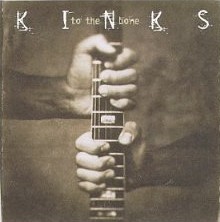
To the Bone is a 1994 live album by the Kinks. Recorded partly at Konk Studios with a small audience, and partly during their 1993 American tour and the 1994 UK tour, it was the band's final release before their breakup in 1996.
Oklahoma U.S.A. is a song written by Ray Davies and performed by British rock band The Kinks on their 1971 LP Muswell Hillbillies.
Konk is the name of a recording studio and record label, established and managed by members of English rock band the Kinks.
"Heart of Gold" is a song by the British rock band The Kinks. Written by Ray Davies, the song appeared on the band's 1983 album State of Confusion.

"Muswell Hillbilly" is a track recorded by British rock band The Kinks. It served as the title track to their 1971 album, Muswell Hillbillies.

"She's Got Everything" is a song written by Ray Davies and released by English rock band the Kinks. It first appeared as the B-side of the Kinks' 1968 single, "Days".

Americana is an album by English rock musician Ray Davies, released by Legacy Recordings in April 2017. Like Davies' 2013 book of the same name, it explores his lifelong fascination with the music and culture of the United States, and his experiences of touring and living there. The album features contributions from members of American country rock band the Jayhawks.
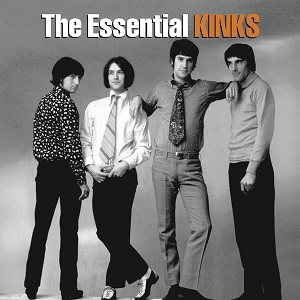
The Essential Kinks is a two disc compilation album by English rock band the Kinks, released on October 14, 2014, on Legacy Records, a division of Sony Music Entertainment.
